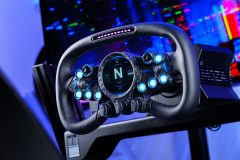With Samsung’s acquisition of HARMAN some time ago, it was believed that smartphone audio was the goal behind the acquisition, and that AKG and JBL companies were the main motivation; what we are finding out now, however, is that the audio goal extends to far beyond the smartphone into the smart car – the autonomous vehicle. Samsung has said before that it looks to bring its new AI, Bixby, to not only smartphones (such as the Galaxy S8, Galaxy S8+, and Galaxy Note 8) but also to the smart car. In return, HARMAN would help Samsung with car infotainment, dashboard lighting, and so on.
Now, to show its commitment to the connected car, Samsung and jointly launched the $300 million Samsung Automotive Innovation Fund (SAIF) alongside of a new Autonomous/ADAS Strategic Business Unit (SBU). The sole purpose of the Automotive Innovation Fund is to invest in connected car technologies, such as the use of Bixby (AI) to enhance the car-driving experience, along with providing safety solutions to improve driving conditions for users and decrease the likelihood of accidents on the open road while contributing to automated driving overall. The ADAS Strategic Business Unit will report directly to HARMAN’s Connected Car division and will help develop technologies that will power autonomous vehicles. SSIC Smart Machines Vice President and industry veteran John Absmeier will maintain his position at SSIC while serving as the new HARMAN SBU Senior Vice President.
The Samsung Automotive Innovation Fund (or SAIF) looks to invest in functional safety TTTech as its first agenda, though Samsung has already made significant investments in automotive startups such as TetraVue, Quanergy, and Oculii (sensors), Graphcore (high-performance computing), and Renovo and Almotive (automated driving).
While Samsung has already secured an autonomous vehicle testing license in both its home country (South Korea) and California, the world’s top global manufacturer won’t manufacture autonomous vehicles but instead work to create new technologies to power them. As Samsung has been an undeniable force in a number of industries, particularly the smartphone market (and is now a presence in AI with Bixby), it looks to play a significant role in the era of connected car computing. Samsung isn’t claiming a desire in connected car manufacturing – not yet, anyway. The key word is “yet.”
Most Popular Tech Stories
- Kelly Betting – How It Works and the Kelly Criterion Explained
- What are Pokies? – The Latest Guide to How Pokies Work in Australia
- AI industry needs annual revenues of more than the UAE’s GDP to offset costs
- Pepe Unchained Meme Token ICO Hits $2 Million – Could PEPU See a Post-Launch Surge Like PEPE?
- 4 Best Meme Coins to Buy with 100x Gains Potential – Top Picks for July 2024
Latest News
Does AI increase productivity at work? New study suggests otherwise
Artificial intelligence software reduces productivity and harms the working environment, according to a study from the freelance platform, Upwork. The findings appear to question how AI is being deployed at...

















